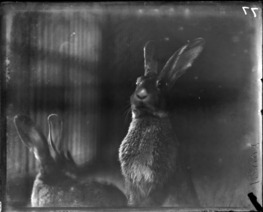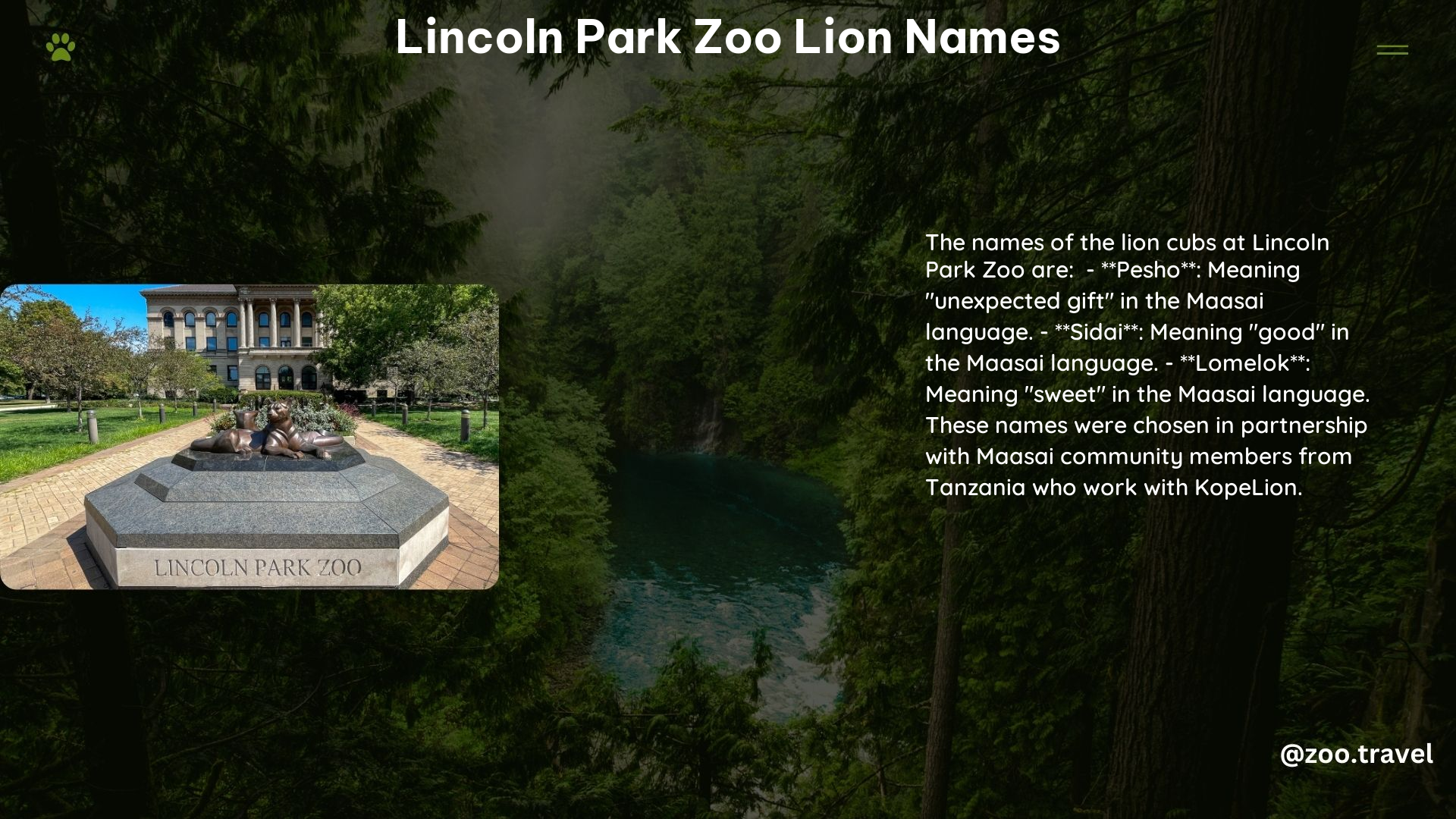The Lincoln Park Zoo in Chicago is home to a majestic lion pride, each member bearing a name rich in cultural significance. From the regal parents Zari and Jabari to their cubs Pilipili, Pesho, Sidai, and Lomelok, these names reflect the zoo’s commitment to conservation and education. This article delves into the meanings behind these names, the family dynamics of the pride, and the state-of-the-art habitat they call home at the Pepper Family Wildlife Center.
What Are the Names of the Adult Lions at Lincoln Park Zoo?

The adult lions at Lincoln Park Zoo are the proud parents of the pride:
-
Zari: The matriarch of the pride, Zari is a 3-year-old female lion. Her name has African origins and is often associated with meanings like “golden” or “flower-like,” reflecting her beauty and importance to the pride.
-
Jabari: The 4-year-old male lion and father of the cubs. His name has Arabic roots and means “brave” or “fearless,” aptly describing his role as the pride’s protector.
These adult lions play crucial roles in maintaining the pride’s structure and in raising their cubs. Their names were carefully chosen to reflect their personalities and the cultural heritage of lions in Africa.
How Many Cubs Are in the Lincoln Park Zoo Lion Pride?

The Lincoln Park Zoo lion pride currently includes four cubs:
-
Pilipili: Born on March 15, 2022, Pilipili is the oldest cub and the big brother to the younger trio.
-
Pesho: One of the three male cubs born on January 9, 2023.
-
Sidai: Another of the three male cubs born alongside Pesho.
-
Lomelok: The third of the triplet cubs born in January 2023.
These four cubs represent the future of the pride and are a testament to the successful breeding program at Lincoln Park Zoo.
What Do the Lion Cub Names Mean?
Each of the lion cub names at Lincoln Park Zoo carries a special meaning:
| Cub Name | Meaning | Language | Significance |
|---|---|---|---|
| Pilipili | “Pepper” | Swahili | Honors the Pepper family, supporters of the Wildlife Center |
| Pesho | “An unexpected gift” | Maa | Reflects the joy of the cub’s birth |
| Sidai | “Good” | Maa | Represents hope and positivity |
| Lomelok | “Sweet” | Maa | Describes the cub’s endearing nature |
The names of the three younger cubs (Pesho, Sidai, and Lomelok) were chosen in partnership with Maasai “lion guardians” (Ilchokuti) in Tanzania. This collaboration highlights the zoo’s commitment to conservation efforts and cultural exchange.
How Was Pilipili’s Name Chosen?
Pilipili’s name has a unique story:
- It means “pepper” in Swahili
- The name honors the Pepper family, who were significant contributors to the transformation of the historic lion house into the Pepper Family Wildlife Center
- This naming choice demonstrates the zoo’s appreciation for its supporters and their role in improving animal habitats
What Is the Significance of Naming the Cubs in Partnership with Maasai Lion Guardians?
The partnership with Maasai lion guardians in naming the cubs is significant for several reasons:
-
Cultural Exchange: It promotes understanding and appreciation of Maasai culture and their relationship with lions.
-
Conservation Awareness: It highlights the importance of local communities in wildlife conservation efforts.
-
Educational Opportunity: It provides zoo visitors with insights into African languages and traditions.
-
Strengthening Partnerships: It reinforces the zoo’s collaboration with KopeLion, their conservation partner in Tanzania.
-
Global Perspective: It emphasizes the global nature of wildlife conservation and the interconnectedness of efforts worldwide.
This naming process serves as a bridge between the lions at Lincoln Park Zoo and their wild counterparts in Africa, reminding visitors of the broader context of lion conservation.
Where Do the Lions Live at Lincoln Park Zoo?
The lions at Lincoln Park Zoo reside in the Pepper Family Wildlife Center, a state-of-the-art facility that replaced the historic Lion House built in 1912. Key features of this habitat include:
- Spacious indoor and outdoor areas designed to mimic the lions’ natural environment
- Multiple viewing points for visitors to observe the lions’ behaviors
- Enrichment features that encourage natural behaviors like hunting and climbing
- Climate-controlled spaces for year-round comfort
- Specialized areas for veterinary care and breeding programs
The Pepper Family Wildlife Center represents a significant upgrade in animal welfare and visitor experience, providing the lions with a more naturalistic habitat while offering guests improved opportunities to learn about and observe these magnificent creatures.
How Does the Lion Exhibit Contribute to Conservation Efforts?
The lion exhibit at Lincoln Park Zoo plays a crucial role in conservation efforts:
-
Public Education: The exhibit educates visitors about lion behavior, habitat needs, and conservation challenges.
-
Research Opportunities: It allows scientists to study lion behavior and health in a controlled environment.
-
Breeding Program: The successful birth of cubs contributes to maintaining genetic diversity in captive lion populations.
-
Partnership with KopeLion: The zoo collaborates with KopeLion to foster human-lion coexistence in the Ngorongoro Conservation Area in northern Tanzania.
-
Fundraising: The exhibit helps raise awareness and funds for lion conservation projects both at the zoo and in the wild.
-
Training Ground: It serves as a training facility for zoo staff and conservationists working with lions.
By combining education, research, and direct conservation action, the lion exhibit at Lincoln Park Zoo contributes significantly to global efforts to protect these magnificent big cats.
What Can Visitors Expect When Visiting the Lion Pride at Lincoln Park Zoo?
Visitors to the Lincoln Park Zoo can expect an engaging and educational experience when visiting the lion pride:
-
Observation Opportunities: Multiple viewing areas allow guests to see the lions in various settings, including indoor and outdoor spaces.
-
Educational Programs: The zoo offers regular talks and presentations about the lions, their care, and conservation efforts.
-
Interactive Displays: Information panels and interactive exhibits provide facts about lion biology, behavior, and conservation.
-
Feeding Times: Scheduled feeding times offer visitors the chance to see the lions at their most active.
-
Photography Opportunities: The exhibit is designed with photographers in mind, offering clear sightlines for capturing memorable images.
-
Conservation Messages: Throughout the exhibit, visitors are informed about the challenges facing wild lion populations and how they can contribute to conservation efforts.
-
Family-Friendly Features: The exhibit is designed to be accessible and engaging for visitors of all ages, with special considerations for children.
By providing a comprehensive and immersive experience, the Lincoln Park Zoo ensures that visitors leave with a deeper understanding and appreciation of lions and the importance of their conservation.
